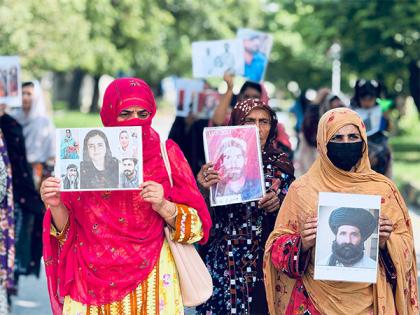Pak: Islamabad sees 36 days of protest against abduction of Baloch leaders
By ANI | Updated: August 21, 2025 08:30 IST2025-08-21T08:21:53+5:302025-08-21T08:30:08+5:30
Islamabad [Pakistan], August 21 : The Baloch Yakjehti Committee (BYC), a leading human rights body, announced on Wednesday that ...

Pak: Islamabad sees 36 days of protest against abduction of Baloch leaders
Islamabad [Pakistan], August 21 : The Baloch Yakjehti Committee (BYC), a leading human rights body, announced on Wednesday that its sit-in protest, which began 36 days ago, is still ongoing in front of the National Press Club in Islamabad, as reported on X.
As per the BYC, the families of abducted Baloch leaders have been continuing their protest and have been denied shelter, mistreated, with many of them being elderly women and young children.
BYC wrote on X, "Today marks the 36th consecutive day of the Islamabad sit-in by families of Baloch Yakjehti Committee (BYC) leaders and the forcibly disappeared. Despite scorching heat, heavy surveillance, and continuous harassment by authorities, these families, many of them elderly women and young children remain seated in front of the National Press Club. For more than a month, they have been denied shelter, mistreated, and pushed away from the very space meant for victims to raise their voices. Yet, their resilience stands unbroken. Each passing day of their protest is a testament to their unwavering courage and the collective demand for justice in Balochistan. Their struggle is not only for their loved ones but for every family torn apart by enforced disappearances."
{{{{twitter_post_id####}}}}𝗗𝗮𝘆 𝟯𝟲 – 𝗜𝘀𝗹𝗮𝗺𝗮𝗯𝗮𝗱 𝗦𝗶𝘁-𝗜𝗻
Today marks the 36th consecutive day of the Islamabad sit-in by families of Baloch Yakjehti Committee (BYC) leaders and the forcibly disappeared.
Despite scorching heat, heavy surveillance, and continuous harassment by authorities,… pic.twitter.com/6YvjqS1dur
— Baloch Yakjehti Committee (@BalochYakjehtiC) August 20, 2025
The sit-in is a reflection of Pakistan's growing human rights crisis. Protests led by Baloch families and political activists continue to rock major cities, highlighting the state's alarming record of enforced disappearances, extrajudicial killings, and impunity.
Enforced disappearances in Balochistan have been a grave human rights issue for decades, rooted in the region's long-standing political and ethnic tensions. For the last several decades, Baloch nationalists, students, activists, and intellectuals have been targeted, allegedly by state security agencies, for demanding greater autonomy or rights.
The Pakistan government has consistently denied involvement, but has failed to transparently investigate or resolve the cases. In recent years, peaceful resistancethrough sit-ins, marches, and now social mediahas grown, led by groups like the Baloch Yakjehti Committee (BYC). These families, driven by grief and hope, continue to demand the safe return of their loved ones and an end to the culture of impunity.
Disclaimer: This post has been auto-published from an agency feed without any modifications to the text and has not been reviewed by an editor
Open in app